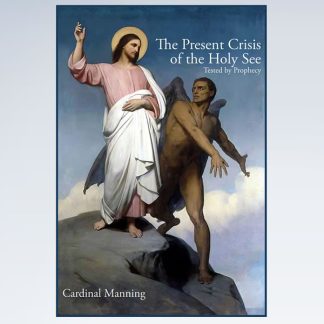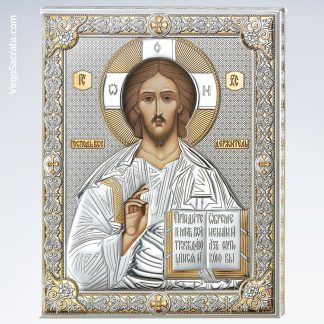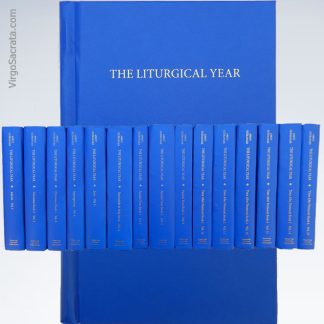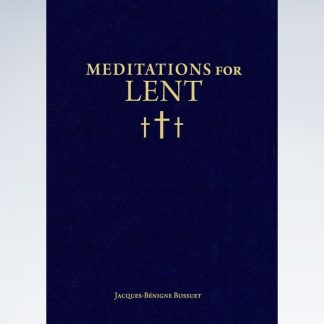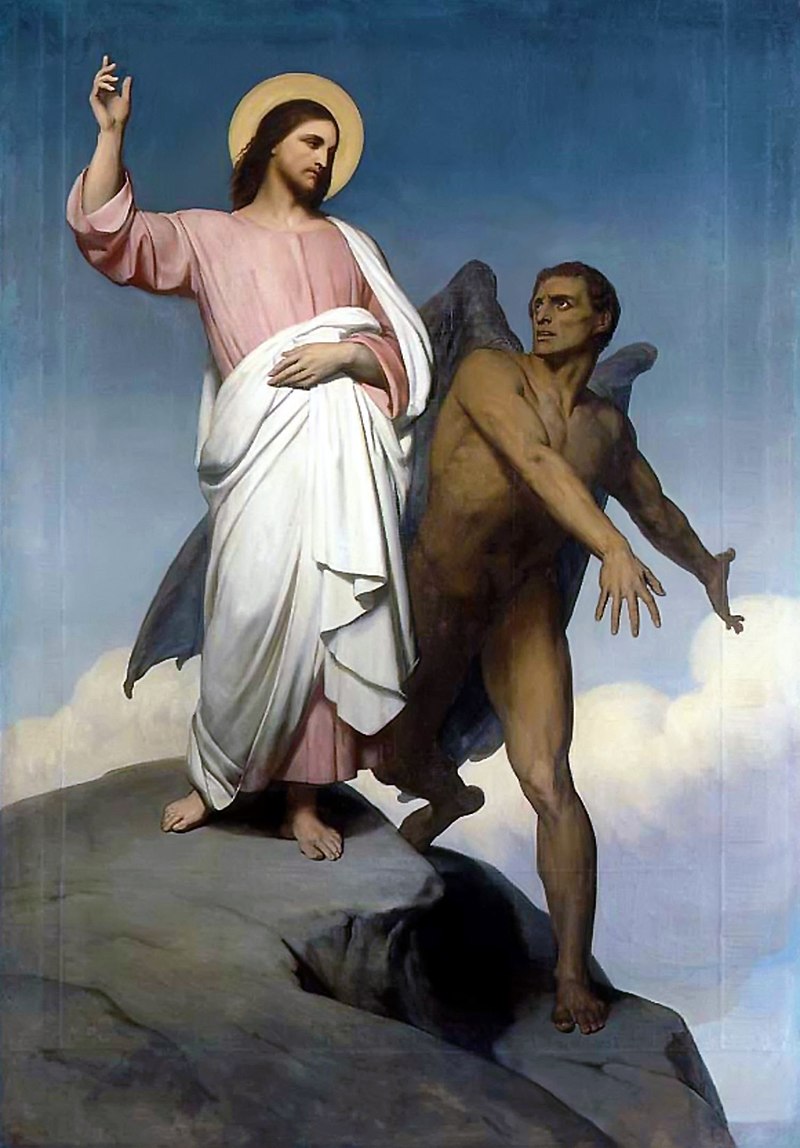

Matthew 4:1
Invocabit Sunday, the first of the six which come during Lent, is one of the most solemn throughout the year. It has the same privilege as Passion and Palm Sundays, – that is, it never gives place to any Feast, not even to that of the Patron, Titular Saint, or Dedication of the Church. In the ancient Calendars, it is called Invocabit, from the first word of the Introit of the Mass. In the Middle-Ages [More especially in France], it was called Brand Sunday, because the young people, who had misconducted themselves during the carnival, were obliged to show themselves to-day, at the Church, with a torch in their hands, as a kind of public satisfaction for their riot and excess.
Lent solemnly opens to-day. We have already noticed, that the four preceding days were added since the time of St. Gregory the Great, in order to make up Forty days of fasting. Neither can we look upon Ash Wednesday as the solemn opening of the Season, for the Faithful are not bound to hear Mass on that day. The Holy Church, seeing her children now assembled together, speaks to them, in her Office of Matins, these eloquent and noble words of St. Leo the Great: “Having to announce to you, dearly beloved, the most sacred and chief Fast, how can I more appropriately begin, than with the words of the Apostle, (in whom Christ himself spoke,) and by saying to you what has just been read: Behold! now is the acceptable time; behold! now is the day of salvation. For although there be no time, which is not replete with divine gifts, and we may always, by God’s grace, have access to his mercy, – yet ought we all to redouble our efforts to make spiritual progress and be animated with unusual confidence, now that the anniversary of the day of our Redemption is approaching, inviting us to devote ourselves to every good work, that so we may celebrate, with purity of body and mind, the incomparable Mystery of our Lord’s Passion.
“It is true, that our devotion and reverence towards so great a Mystery should be kept up during the whole year, and we ourselves be, at all times, in the eyes of God, the same as we are bound to be at the Easter Solemnity. But this is an effort which only few among us have the courage to sustain. The weakness of the flesh induces us to relent our austerities; the various occupations of every-day life take up our thoughts; and thus, even the virtuous find their hearts clogged by this world’s dust. Hence it is, that our Lord has most providentially given us these Forty Days, whose holy exercises should be to us a remedy, whereby to regain our purity of soul. The good works and the holy fastings of this Season were instituted as an atonement and obliteration of the sins we commit during the rest of the Year.
“Now, therefore, that we are about to enter upon these days, which are so full of mystery, and were instituted for the holy purpose of purifying both our soul and body, let us, dearly beloved, be careful to do as the Apostle bids us, and cleanse ourselves from all defilement of the flesh and the spirit: that thus the combat between the two substances being made less fierce, the soul, which, when she herself is subject to God, ought to be the ruler of the body, will recover her own dignity and position. Let us also avoid giving offence to any man, so that there be none to blame or speak evil things of us. For we deserve the harsh remarks of infidels, and we provoke the tongues of the wicked to blaspheme religion, when we, who fast, lead unholy lives. For our Fast does not consist in the mere abstaining from food; nor is it of much use to deny food to our body, unless we restrain the soul from sin.” [Fourth Sermon for Lent]
Each Sunday of Lent offers to our consideration a passage from the Gospel, which is in keeping with the sentiments wherewith the Church would have us be filled. To-day she brings before us the Temptation of our Lord in the Desert. What light and encouragement there is for us in this instruction!
We acknowledge ourselves to be sinners; we are engaged, at this very time, in doing penance for the sins we have committed;- but, how was it that we fell into sin? The devil tempted us; we did not reject the temptation; then, we yielded to the suggestion, and the sin was committed. This is the history of our past; and such it would, also, be for the future, were we not to profit by the lesson given us, to-day, by our Redeemer.
When the Apostle speaks of the wonderful mercy shown us by our Divine Saviour, who vouchsafed to make himself like to us in all things, save in sin, he justly lays stress on his temptations [Heb. iv. 15]. He, who was very God, humbled himself even so low as this, to prove how tenderly he compassionated us. Here, then, we have the Saint of Saints allowing the wicked spirit to approach him, in order that we might learn, from His example, how are to gain victory under temptation.
Satan has had his eye upon Jesus; he is troubled at beholding such matchless virtue. The wonderful circumstances of his Birth, – the Shepherds called by Angels to his Crib, and the Magi guided by the Star; the Infant’s escape from Herod’s plot; the testimony rendered to this new Prophet by John the Baptist;- all these things which seem so out of keeping with the thirty years spent in obscurity at Nazareth, are a mystery to the infernal serpent, and fill him with apprehension. The ineffable mystery of the Incarnation has been accomplished unknown to him; he never once suspects that the humble Virgin, Mary, is she who was foretold by the Prophet Isaias, as having to bring forth the Emmanuel [Is. viii. 14]; but he is aware that the time is come, that the last Week spoken of to Daniel has begun its course, and that the very Pagans are looking towards Judea for a Deliverer. He is afraid of this Jesus; he resolves to speak with him, and elicit from him some expression which will show him whether he be or not the Son of God; he will tempt him to some imperfection, or sin, which, should he commit, will prove that the object of so much fear is, after all, but a mortal Man.
The enemy of God and men was, of course, disappointed. He approached Jesus; but all his efforts only turn to his own confusion. Our Redeemer, with all the self-possession and easy majesty of a God-Man, repels the attacks of Satan; but he reveals not his heavenly origin. The wicked spirit retires, without having made any discovery beyond this, – that Jesus is a prophet, faithful to God. Later on, when he sees the Son of God treated with contempt, calumniated, and persecuted; when he finds, that his own attempts to have him put to death, are so successful;- his pride and his blindness will be at their height: and not till Jesus expires on the Cross, will he learn, that his victim was not merely Man, but Man and God. Then will he discover, how all his plots against Jesus have but served to manifest, in all their beauty, the Mercy and Justice of God;- his Mercy, because be saved mankind: and his Justice, because be broke the power of hell for ever.
These were the designs of Divine Providence in permitting the wicked spirit to defile, by his presence, the retreat of Jesus, and speak to him, and lay his hands upon him. But, let us attentively consider the triple temptation in all its circumstances; for our Redeemer only suffered it, in order that he might instruct and encourage us.
We have three enemies to fight against; our soul has three dangers; for, as the Beloved Disciple says: All that is in the world, is the concupiscence of the flesh, and the concupiscence of the eyes, and the pride of life! [1 St. John, ii. 16].
By the concupiscence of the flesh, is meant the love of sensual things, which covets whatever is agreeable to the flesh, and, when not curbed, draws the soul into unlawful pleasures. Concupiscence of the eyes expresses the love of the goods of this world, such as riches, and possessions; these dazzle the eye, and then seduce the heart. Pride of life is that confidence in ourselves, which leads us to be vain and presumptuous, and makes us forget that all we have, – our life and every good gift, – we have from God.
Not one of our sins but what comes from one of these three sources; not one of our temptations but what aims at making us accept the concupiscence of the flesh, or the concupiscence of the eyes, or the pride of life. Our Saviour, then, who would be our model in all things, deigned to subject himself to these three temptations.
First of all, Satan tempts him in what regards the Flesh: he suggests to him to satisfy the cravings of hunger, by working a miracle, and changing the stones into bread. If Jesus consent, and show an eagerness in giving this indulgence to his body, the tempter will conclude that he is but a frail mortal, subject to concupiscence like other men. When he tempts us, who have inherited evil concupiscence from Adam, his suggestions go further than this; he endeavours to defile the soul by the body. But the sovereign holiness of the Incarnate Word could never permit Satan to use upon Him the power which he has received of tempting man in his outward senses. The lesson, therefore, which the Son of God here gives us, is one of temperance: but we know, that, for us, temperance is the mother of purity, and that intemperance excites our senses to rebel.
The second temptation is to pride: Cast thyself down; the Angels shall bear thee up in their hands. The enemy is anxious to see if the favours of heaven have produced in Jesus’ soul that haughtiness, that ungrateful self-confidence, which makes the creature arrogate God’s gifts to itself, and forget its benefactor. Here, also, he is foiled; our Redeemer’s humility confounds the pride of the rebel angel.
He then makes a last effort: he hopes to gain over by ambition Him who has given such proofs of temperance and humility. He shows him all the kingdoms of the world, and the glory of them; and says to him: All these will I give thee, if falling down, thou wilt adore me. Jesus rejects the wretched offer, and drives from him the seducer, the prince of this world [St. John, xiv. 30]; hereby teaching us, that we must despise the riches of this world, as often as our keeping or getting them is to be on the condition of our violating the law of God and paying homage to Satan.
But, let us observe how it is, that our Divine Model, our Redeemer, overcomes the tempter. Does be hearken to his words? Does he allow the temptation time? and give it strength by delay? We did so, when we were tempted, and we fell. But our Lord immediately meets each temptation with the shield of God’s word. He says: It is written: Not on bread alone doth man live. – It is written: Thou shalt not tempt the Lord thy God. – It is written: The Lord thy God shalt thou adore, and Him only shalt thou serve. – This, then, must be our practice for the time to come. Eve brought perdition on herself, and on the whole human race, because she listened to the serpent. He that dallies with temptation, is sure to fall.
We are now in a Season of extraordinary grace; our hearts are on the watch, dangerous occasions are removed, everything that savours of worldliness is laid aside; our souls, purified by prayer, fasting, and almsdeeds, are to rise with Christ, to a new life;- but, shall we persevere? All depends upon how we behave under temptation. Here, at the very opening of Lent, the Church gives us this passage of the Holy Gospel, that we may have, not only precept, but example. If we be attentive and faithful, the lesson she gives us will produce its fruit; and when we come to the Easter Solemnity, we shall have those sure pledges of perseverance, – vigilance, self-diffidence, prayer, and the never-failing help of Divine Grace.
The Greek Church, in spite of her principle of never admitting a Feast during Lent, celebrates to-day one of her greatest solemnities. It is called Orthodoxia, and was instituted in memory of the restoration of sacred Images in Constantinople and the Eastern Empire, in the year 842, when the Empress Theodora, aided by the holy Patriarch Methodius, put a stop to the Iconoclast persecution, and restored to the Churches the holy Images, which the fury of the heretics had taken away.
Source: The Liturgical Year, by Dom Prosper Guéranger.
| Invocabit me, et ego exaudiam eum: eripiam eum et glorificabo eum: longitudine dierum adimplebo eum. Ps. Qui habitat in adjutorio Altissimi; in protectione Dei coeli commorabitur. V. Gloria Patri. Invocabit me. | He shall cry to me, and I will hear him: I will deliver him, and I will glorify him: I will fill him with length of days. Ps. He that dwelleth in the aid of the Most high, shall abide under the protection of the God of Heaven. V. Glory, &c. He shall cry. |
O Lord Jesus! who spent forty days in the desert without food or drink, and didst permit Thy self to be tempted by the evil spirit, give me, I beseech Thee by that holy fast, the grace to combat, during this holy season of Lent, under Thy protection, against intemperance, and to resist the suggestions of Satan that I may win the crown of eternal life. Amen.

-
The Present Crisis of the Holy See – Tested by Prophecy€14.47
-
Byzantine Icon Christ Pantocrator (Christ the Almighty)€265.24
-
Liturgical Year 15 Volume Set, By Dom Gueranger€255.59
-
The Imitation of Christ (Deluxe Edition) by Thomas À Kempis€50.15
-
Meditations for Lent by Bishop Bossuet€14.47
-
The Spiritual Combat and a Treatise on Peace of Soul€18.33
VIRGÓ SACRÁTA is a Christian mission-driven online resource and shop inspired from the beauty of Catholic faith, tradition, and arts. Our mission is to “Restore All Things to Christ!”, in continuing the legacy of Pope St. Pius X under the patronage of the Blessed Virgin Mary. “Who is she that cometh forth as the morning rising, fair as the moon, bright as the sun, terrible as an army set in battle array?” O Mary, conceived without sin, pray for us who have recourse to Thee.

